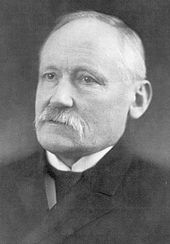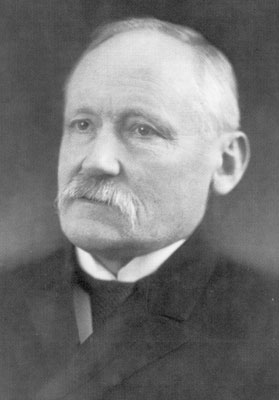J. J. M. de Groot
Dutch sinologist and historian of religion From Wikipedia, the free encyclopedia
Jan Jakob Maria de Groot (18 February 1854 – 24 September 1921) was a Dutch sinologist and historian of religion. He taught at the Leiden University and later at the University of Berlin, and is chiefly remembered for his monumental work, The Religious System of China, Its Ancient Forms, Evolution, History and Present Aspect, Manners, Customs and Social Institutions Connected Therewith. The two "books" of this detailed and well-illustrated treatise appeared in six volumes - and, according to the preface in the first volume, the System was originally meant to include several more "books".
J.J.M. de Groot | |||||||||
|---|---|---|---|---|---|---|---|---|---|
 | |||||||||
| Born | 18 February 1854 | ||||||||
| Died | 24 September 1921 (aged 67) | ||||||||
| Nationality | Dutch | ||||||||
| Scientific career | |||||||||
| Fields | Chinese history, religion | ||||||||
| Institutions | Leiden University | ||||||||
| Academic advisors | Gustaaf Schlegel | ||||||||
| Notable students | J.J.L. Duyvendak | ||||||||
| Chinese name | |||||||||
| Chinese | 高延 | ||||||||
| |||||||||
De Groot became a corresponding member of the Royal Netherlands Academy of Arts and Sciences in 1887, a foreign member in 1892 and a regular member in 1911.[1]

Bibliography
- J. J. M. De Groot, The Religious System of China, Brill, Leiden, 1892–1910, rééd. Taipei 1964
- vol. I : Disposal of the Dead. Part I : Funeral rites. Part II : The ideas of resurrection, 1892, XXIV-360 p
- vol. II : Disposal of the Dead. Part III : The Grave (first half), 1894, 468 p. : book I : Disposal of the Dead, p. 359-827
- vol. III : Disposal of the Dead. The Grave (second half). Fung-shui,1897, 640 p.
- vol. IV : The soul and Ancestral Worship. Part I : The Soul in Philosophy and Folk-Conception, 464 p.
- vol. V : The soul and Ancestral Worship. Part II : Demonology. Part III : Sorcery, 1908, 464 p.
- vol. VI : The soul and Ancestral Worship. Part IV : The War against Spectres. Part V : The prietshood of Animism (wu), 1910, 414 p.
- index for volumes I, II, III, 40 p.
- J. J. M. De Groot, Universismus - Die Grundlage der Religion und Ethik, des Staatswesens und der Wissenschaften Chinas
Sources
External links
Wikiwand - on
Seamless Wikipedia browsing. On steroids.
